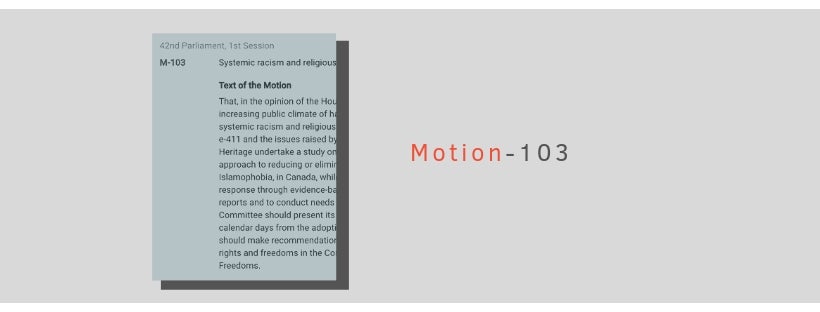
FACTSHEET: Motion-103
IMPACT: Motion-103 is a non-binding motion introduced by the Liberal MP Iqra Khalid in December 2016. It calls on the Canadian government to condemn Islamophobia and recognize the need to “quell the public climate of fear and hate”. The motion passed in March 2017.
In December 2016, Canadian MP Iqra Khalid introduced Motion-103 (M-103) in response to the growing climate of fear and hatred. On March 23, 2017, the Canadian parliament approved M-103 with a 201-91 vote margin. The Motion calls on the Canadian parliament to “condemn Islamophobia” and “asks a parliamentary committee to launch a study on how the government could address the issue, with recommendations due in mid-November.”
Much of the debate surrounding the motion focused on the word “Islamophobia.” Saskatchewan Conservative MP David Anderson noted the lack of a consistent definition made the motion difficult to understand and evaluate. Journalist Tarek Fatah, who has likened multiculturalism to a drug, stated that including the words ‘denouncing Islamophobia’ in the motion would “infringe on the inalienable right of Muslim Canadians to critique our religion.” Additionally, the party leader of the People’s Party of Canada, Maxime Bernier, claimed the motion would “seriously threaten free speech,” and stated she would oppose the motion unless it “it is amended to remove the word ‘islamophobia.’”
On February 2017, the CBC reported that Conservative MP Anderson proposed a counter-motion on Opposition day, which “mirrors M-103 but removes the word ‘Islamophobia’ and instead calls on government to ‘condemn all forms of systemic racism, religious intolerance and discrimination of Muslims, Jews, Christians, Sikhs, Hindus and other religious communities.’”
In February 2017 on twitter, Conservative MP Kellie Leitch called on individuals to support her petition to oppose M-103. MP Leitch suggested that M-103 was “singling Islam out for special treatment.”
Critics also alleged that the Motion would create a path for legislative changes in accordance with “Sharia law,” despite the fact that the motion does not call for legislative additions.
A March 2017 report published by the Tessellate Institute, a non-profit research institute that explores and documents the lived experiences of Muslims in Canada, analyzed the 50 most used words in tweets containing “#M103” from February 12 to the evening of February 15 on Twitter. The analysis found that “many of the tweets communicated an irrational, fearful, and unsubstantiated suspicion towards Muslims and the place of Islam in Canadian society[,] painting Islam as monolithic, violent, ideological, and as a threat to western values.”
In a February 2017 CBC news article, reporter Kathleen Harris noted that Khalid had received over “50,000 emails” in response to Khalid’s introduction of the motion. The article noted that many of the emails included “overt discrimination or direct threats.” When discussing these emails, Khalid stated she had to ask her “staff to lock the office behind me as I now fear for their safety…I have asked them not to answer all phone calls so they don’t hear the threats, insults and unbelievable amount of hate shouted at them and myself.”
In February 2017 during a House of Commons parliament session, Khalid read out some of the hate mail she received as a result of her support for M-103. Some of the emails read, “We will burn down your mosques, draper head Muslim,” and “Kill her and be done with it. I agree she is here to kill us. She is sick and she needs to be deported.”
Demonstrations across Canada were held in protest of the motion by the Canadian Coalition for Concerned Citizens, a group that had previously held monthly “anti-Muslim demonstrations, billed as protests in defense of free speech.” An article in the CBC reported that small contingents from Soldiers of Odin and PEGIDA, described by the article as “offshoots of European far-right street movements,” were also present at the demonstrations. The largest protest was organized by La Meute, described by the CBC article as “an online group that believes radical Islam is on the rise in Quebec.”
Supporters of the motion included Arif Virani, Member of Parliament for Parkdale–High Park, who stated, “In the wake of the horrific terror attack on the mosque in Quebec…we need to address the rise in hatred we are observing. In order to overcome this type of anti-Muslim discrimination we must call it out by name: Islamophobia.”
In response to the study requested by M-103, in February 2018, the Standing Committee of Canadian Heritage presented its report to the House of Commons. The report issued 30 recommendations, including calling on the government to “take a strong leadership role to actively condemn systemic racism and religious discrimination including Islamophobia.” Additionally, the report recommends the government designate January 29 as National Day of Remembrance and Action on Islamophobia.
In October 2016, the House of Commons adopted an anti-Islamophobia motion by unanimous consent as petition e411. The petition was sponsored by MP Frank Baylis and presented by New Democratic Party leader, Thomas Mulcair. The motion passed quietly and did not meet the same resistance as M-103 did; however, it was tabled in December 2016. An article in The Huffington Post noted that the difference between petition e411 and MP Khalid’s motion was that Khalid requested a study on religious discrimination and systematic collection of data on hate crimes in Canada.
—
This factsheet is published in collaboration between the Bridge Initiative and researchers at Wilfrid Laurier University. More information about this project can be found here.

 Search
Search